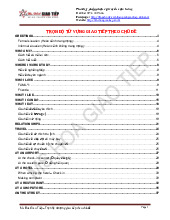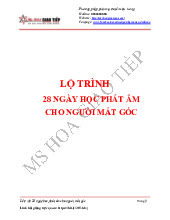


Preview text:
PROJECT GUIDELINES Class: ENCS140026 Level: A2.2
PROJECT 2A: WEEKEND ADVENTURE WITH AN ENGLISH S - PEAKING FRIEND Objectives:
To enhance A2 level students' speaking and communication skills in English.
To plan a weekend itinerary for hosting an English-speaking friend.
To facilitate language improvement through hosting a friend visiting their country. LANGUAGE USE:
- Grammar: Comparative adjectives, superlative adjective s
- Vocabulary: Adjectives to describe places (beautiful, crowded, dangerous, dark, empty,
friendly, horrible, light, lovely, safe, ugly, unfriendly…)
- Pronunciation: -er endings
- Communication: Talking about and describing places
Project Overview: Students will work in pairs or small groups to create a detailed itinerary for their
imaginary English-speaking friend's weekend visit. The project will cover various aspects such as
places to visit, meals, tourist attractions, transportation, and activities based on the friend's interests.
Suggested project components:
1. Introduction (Day 1): •
Morning: Meet at a local cafe for a traditional breakfast and introductions. •
Afternoon: Explore a nearby historical town with a guided walking tour. •
Evening: Dinner at a popular local restaurant with authentic cuisine.
2. Adventure Day (Day 2): •
Morning: Visit a scenic beach for relaxation and seaside activities (e.g., beach volleyball, swimming). •
Afternoon: Picnic in a nearby forest with hiking trails and nature exploration. •
Evening: Dinner at a beachside seafood restaurant.
3. Cultural Exploration (Day 3): •
Morning: Visit an art gallery showcasing local artists' work. •
Afternoon: Explore a museum highlighting the country's history and cultural heritage. •
Evening: Attend a cultural event or performance in the city.
Key Considerations: • Meals: •
Introduce the friend to local cuisine, including traditional breakfast items, regional dishes, and popular desserts. •
Consider dietary preferences and any specific food restrictions. • Tourist Attractions: •
Choose attractions that reflect the country's culture, history, and natural beauty. •
Provide information on the significance of each attraction. • Getting Around: •
Plan transportation modes for each activity (bus, car, walking) and include details such as bus
numbers, routes, or car rental options. •
Activities of Interest: •
Tailor activities based on the friend's interests (e.g., sports, shopping, cultural events). •
Incorporate opportunities for meeting local people, perhaps through community events or guided tours.
Assessment Criteria: Students will be evaluated based on the following criteria: •
Clarity and organization of the itinerary. •
Use of appropriate vocabulary and expressions. •
Creativity in planning activities that cater to the friend's interests. •
Accuracy of information regarding locations, attractions, and transportation. •
Overall oral presentation and communication skills during the presentation of the itinerary.
Presentation: Students will present their weekend itinerary to the class, simulating a conversation
with their English-speaking friend. Encourage students to use visual aids, such as maps or images, to enhance their presentations.
Feedback and Reflection: After each presentation, provide constructive feedback and encourage
students to reflect on the challenges and successes of planning the itinerary. This will promote self-
awareness and improvement in future communication tasks.
PROJECT CUE CARD (For Students)
An English-speaking friend is traveling around your country. He/she is going to spend next
weekend with you. Plan two or three activities for each day and make notes in the chart. Think about:
• places to visit (towns, beach, forest, etc)
• places and food for meals
• tourist attractions (art galleries, museums, etc.)
• getting around (bus, car, train, etc.)
• activities your friend enjoys (sports, shopping, meeting people, going out, etc.)
------------------------------------------------------------------------------------------------------------------------



